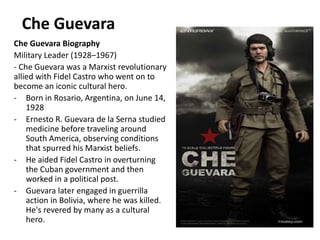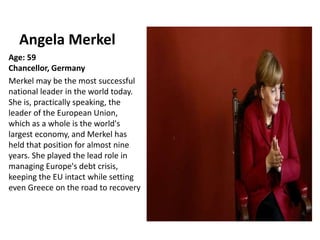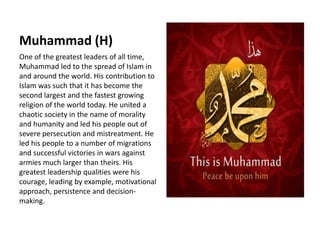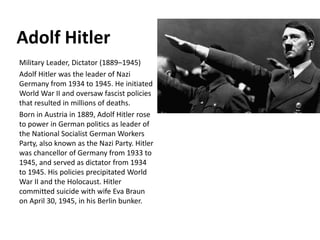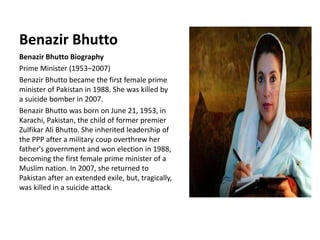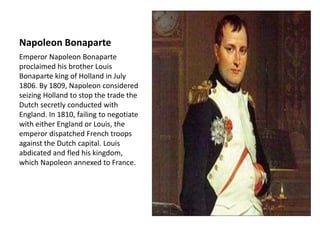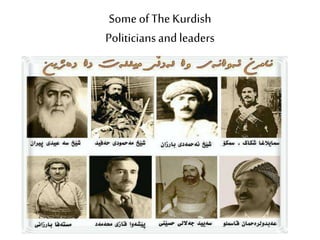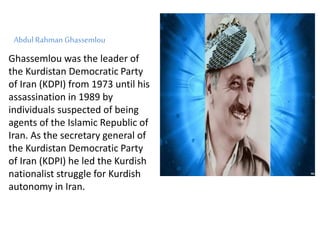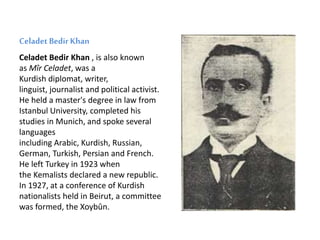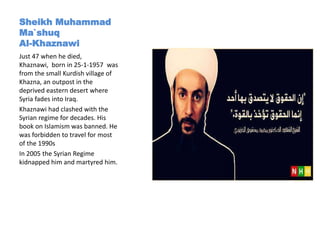The Leadership
- 2. THE ACTION OF LEADING A GROUP OF PEOPLE OR AN ORGANIZATION, OR THE ABILITY TO DO THIS. The Leadership
- 3. • Leadership has been described as "a process of social influence in which a person can enlist the aid and support of others in the accomplishment of a common task".For example, some understand a leader simply as somebody whom people follow, or as somebody who guides or directs others, while others define leadership as "organizing a group of people to achieve a common goal"
- 4. Leadership Characteristics • Proactive vs. Reactive The exceptional leader is always thinking three steps ahead. Working to master his/her own environment with the goal of avoiding problems before they arise. Flexible/Adaptable How do you handle yourself in unexpected or uncomfortable situations? An effective leader will adapt to new surroundings and situations, doing his/her best to adjust. A Good Communicator As a leader, one must listen...a lot! You must be willing to work to understand the needs and desires of others. A good leader asks many questions, considers all options, and leads in the right direction. Respectful Treating others with respect will ultimately earn respect.
- 5. • Quiet Confidence Be sure of yourself with humble intentions. Enthusiastic Excitement is contagious. When a leader is motivated and excited about the cause people will be more inclined to follow. Open-Minded Work to consider all options when making decisions. A strong leader will evaluate the input from all interested parties and work for the betterment of the whole. Resourceful Utilize the resources available to you. If you don't know the answer to something find out by asking questions. A leader must create access to information. Rewarding An exceptional leader will recognize the efforts of others and reinforce those actions. We all enjoy being recognized for our actions!
- 6. • Well Educated Knowledge is power. Work to be well educated on community policies, procedures, organizational norms, etc. Further, your knowledge of issues and information will only increase your success in leading others. Open to Change A leader will take into account all points of view and will be willing to change a policy, program, cultural tradition that is out-dated, or no longer beneficial to the group as a whole. Interested in Feedback How do people feel about your leadership skill set? How can you improve? These are important questions that a leader needs to constantly ask the chapter. View feedback as a gift to improve. Evaluative Evaluation of events and programs is essential for an organization/group to improve and progress. An exceptional leader will constantly evaluate and change programs and policies that are not working.
- 7. • Organized Are you prepared for meetings, presentations, events and confident that people around you are prepared and organized as well? Consistent Confidence and respect cannot be attained without your leadership being consistent. People must have confidence that their opinions and thoughts will be heard and taken into consideration. Delegator An exceptional leader realizes that he/she cannot accomplish everything on his own. A leader will know the talents and interests of people around him/her, thus delegating tasks accordingly. Initiative A leader should work to be the motivator, an initiator. He/she must be a key element in the planning and implementing of new ideas, programs, policies, events, etc.
- 8. Some of world National and politic leaders
- 9. Abraham Lincoln Abraham Lincoln was the 16th president of the United States. He preserved the Union during the U.S. Civil War and brought about the emancipation of slaves. Abraham Lincoln is regarded as one of America's greatest heroes due to both his incredible impact on the nation and his unique appeal. His is a remarkable story of the rise from humble beginnings to achieve the highest office in the land; then, a sudden and tragic death at a time when his country needed him most to complete the great task remaining before the nation. Lincoln's distinctively human and humane personality and historical role as savior of the Union and emancipator of the slaves creates a legacy that endures. His eloquence of democracy and his insistence that the Union was worth saving embody the ideals of self-government that all nations strive to achieve.
- 10. Che Guevara Che Guevara Biography Military Leader (1928–1967) - Che Guevara was a Marxist revolutionary allied with Fidel Castro who went on to become an iconic cultural hero. - Born in Rosario, Argentina, on June 14, 1928 - Ernesto R. Guevara de la Serna studied medicine before traveling around South America, observing conditions that spurred his Marxist beliefs. - He aided Fidel Castro in overturning the Cuban government and then worked in a political post. - Guevara later engaged in guerrilla action in Bolivia, where he was killed. He's revered by many as a cultural hero.
- 11. Mahatma Gandhi Mahatma Gandhi Biography Anti-War Activist (1869–1948) Mahatmas Gandhi was the primary leader of India's independence movement and also the architect of a form of civil disobedience that would influence the world. Born on October 2, 1869, in Porbandar, India, Mahatma Gandhi studied law and came to advocate for the rights of Indians, both at home and in South Africa. Gandhi became a leader of India's independence movement, organizing boycotts against British institutions in peaceful forms of civil disobedience. He was killed by a fanatic in 1948.
- 12. Angela Merkel Age: 59 Chancellor, Germany Merkel may be the most successful national leader in the world today. She is, practically speaking, the leader of the European Union, which as a whole is the world's largest economy, and Merkel has held that position for almost nine years. She played the lead role in managing Europe's debt crisis, keeping the EU intact while setting even Greece on the road to recovery
- 13. Dalai Lama Age: 78 Spiritual leader of the Tibetan people For over 50 years he has campaigned tirelessly for peace, nonviolence, democracy, and reconciliation, especially among world religions; he has met countless times with popes, rabbis, imams, and others to find common ground. Winner of the 1989 Nobel Peace Prize, the Dalai Lama radiates charisma. As for his influence, just ask those who look for his guidance on Twitter. All 8.6 million of them.
- 14. Muhammad (H) One of the greatest leaders of all time, Muhammad led to the spread of Islam in and around the world. His contribution to Islam was such that it has become the second largest and the fastest growing religion of the world today. He united a chaotic society in the name of morality and humanity and led his people out of severe persecution and mistreatment. He led his people to a number of migrations and successful victories in wars against armies much larger than theirs. His greatest leadership qualities were his courage, leading by example, motivational approach, persistence and decision- making.
- 15. Adolf Hitler Military Leader, Dictator (1889–1945) Adolf Hitler was the leader of Nazi Germany from 1934 to 1945. He initiated World War II and oversaw fascist policies that resulted in millions of deaths. Born in Austria in 1889, Adolf Hitler rose to power in German politics as leader of the National Socialist German Workers Party, also known as the Nazi Party. Hitler was chancellor of Germany from 1933 to 1945, and served as dictator from 1934 to 1945. His policies precipitated World War II and the Holocaust. Hitler committed suicide with wife Eva Braun on April 30, 1945, in his Berlin bunker.
- 16. Benazir Bhutto Benazir Bhutto Biography Prime Minister (1953–2007) Benazir Bhutto became the first female prime minister of Pakistan in 1988. She was killed by a suicide bomber in 2007. Benazir Bhutto was born on June 21, 1953, in Karachi, Pakistan, the child of former premier Zulfikar Ali Bhutto. She inherited leadership of the PPP after a military coup overthrew her father's government and won election in 1988, becoming the first female prime minister of a Muslim nation. In 2007, she returned to Pakistan after an extended exile, but, tragically, was killed in a suicide attack.
- 17. Ariel Sharon Ariel Sharon Biography Military Leader, Prime Minister (1928–2014) Ariel Sharon was an Israeli military leader and politician who was elected prime minister of the country in 2001, serving until 2006. Born on February 27, 1928, in Kfar Malal, Palestine (now Israel), Ariel Sharon was a key player in Israeli military operations for decades, inspiring debate over the ethics of his tactics. Founder of the Likud Party, Sharon served in Parliament and became minister of defense in 1981, later taking on other posts. He was elected prime minister in 2001 and served until 2006, upon suffering a stroke. After eight years in a coma, Sharon died on January 11, 2014 at the age of 85.
- 18. Napoleon Bonaparte Emperor Napoleon Bonaparte proclaimed his brother Louis Bonaparte king of Holland in July 1806. By 1809, Napoleon considered seizing Holland to stop the trade the Dutch secretly conducted with England. In 1810, failing to negotiate with either England or Louis, the emperor dispatched French troops against the Dutch capital. Louis abdicated and fled his kingdom, which Napoleon annexed to France.
- 19. Some of The Kurdish Politiciansandleaders
- 20. Abdul Rahman Ghassemlou Ghassemlou was the leader of the Kurdistan Democratic Party of Iran (KDPI) from 1973 until his assassination in 1989 by individuals suspected of being agents of the Islamic Republic of Iran. As the secretary general of the Kurdistan Democratic Party of Iran (KDPI) he led the Kurdish nationalist struggle for Kurdish autonomy in Iran.
- 21. Celadet Bedir Khan Celadet Bedir Khan , is also known as Mîr Celadet, was a Kurdish diplomat, writer, linguist, journalist and political activist. He held a master's degree in law from Istanbul University, completed his studies in Munich, and spoke several languages including Arabic, Kurdish, Russian, German, Turkish, Persian and French. He left Turkey in 1923 when the Kemalists declared a new republic. In 1927, at a conference of Kurdish nationalists held in Beirut, a committee was formed, the Xoybûn.
- 22. Qazi Muhammad Qazi Muhammad, (1893– 1947) was a Kurdish leader and the Head of the Republic of Kurdistan (Republic of Mahabad), the second modern self declared Kurdish state in the Middle East (after the Republic of Ararat). Contemporary theorists believe that Qazi Muhammad was one of the most advanced Kurdish leaders in history.
- 23. Mustafa Barzani Mustafa Barzani, (March 14, 1903 – March 1, 1979) also known as Mullah Mustafa was a Kurdish nationalist leader, and the most prominent political figure in modern Kurdish politics. In 1946, he was chosen as the leader of the Kurdistan Democratic Party (KDP) to lead the Kurdish revolution against Iraqi regimes. Barzani was the primary political and military leader of the Kurdish revolution until his death in March 1979. He led campaigns of armed struggle against both the Iraqi and Iranian governments.
- 24. Sheikh Muhammad Ma`shuq Al-Khaznawi Just 47 when he died, Khaznawi, born in 25-1-1957 was from the small Kurdish village of Khazna, an outpost in the deprived eastern desert where Syria fades into Iraq. Khaznawi had clashed with the Syrian regime for decades. His book on Islamism was banned. He was forbidden to travel for most of the 1990s In 2005 the Syrian Regime kidnapped him and martyred him.
- 25. Some ofThe KurdishPoets and writers
- 26. Malaye Jaziri Malaye Jaziri, (1570-1640) was one of the most famous Kurdish writer, poet and mystic. His pen name was Nîşanî. He was born in Jazira (Cizre), the capital of Bohtan principality. Here the first school of classical Kurdish poetry in the Kurmanji dialect was established. Malaye Jaziri was the leading representative of this school. His ties to this tradition are expressed through the strong sufi elements and through the concept of love in his poetry. In his universe there are no clear borderlines between human and divine love. Jaziri's poetry is also deeply rooted in romantic patriotism, and the poems he wrote in tribute to the Kurdish princes differ from the poetry written at the courts of the mighty kings in the region. Kurdistan's name appears frequently and is always connected with great pride. Jaziri's main literary work is the collection of his poems called, "Dîwana Melayê Cizîrî"
- 27. Cigerxwîn Cigerxwîn or Cegerxwîn, 1903 – October 22, 1984) was a renowned Kurdish polymath and nationalist. He is known to be one of the most influential Kurdish writers and poets in the Kurdistan region of the Middle East, and his work has been renewed for the creation of hundreds of songs and played a crucial role in the preservation of Kurdish cultural heritage.
- 28. Abdulla Pashew Abdulla Pashew,, is a well-known Kurdish poet. He was born in 1946 in Hewlêr. He studied at the Teachers' Training Institute in Hewlêr, and participated in the Foundation Congress of the Kurdish Writers' Union in Baghdad in 1970. In 1973 he went to the former Soviet Union, and in 1979 he received an M.A. in pedagogy with a specialization in foreign languages. In 1984 he was granted a PhD in Philology from the Institute of Oriental Studies of the USSR Academy of Sciences. For the next five years he was a professor at al-Fatih University in Tripoli, Libya. He has lived in Finland since 1995. He published his first poem in 1963 and his first collection in 1967. Since then he has published eight collections. The latest, Berew Zerdeper (Towards the Twilight), was published in Sweden in 2001. He has also translated a number of writers and poets into Kurdish, including Walt Whitman and Alexandr Pushkin.
- 29. Ahmad Khani (1650–1707) was a Kurdish writer, poet and philosopher. He was born amongst the Khani's tribe in Hakkari province. He moved to Bayezid and settled there. Later he started with teaching Kurdish (Kurmanji) at basic level. Khani was fluent in Kurdish, Arabic and Persian. He wrote his Arabic-Kurdish dictionary "Nûbihara Biçûkan" (The Spring of Children) in 1683 to help children with their learning process. His most important work is the Kurdish classic love story "Mem and Zin"(Mem û Zîn) (1692). His other work include a book called Eqîdeya Îmanê (The Path of Faith), which is part poem and part prose. The book explains the five pillars of Islamic faith. It was published in 2000 in Sweden.
- 30. Faqi Tayran Faqi Tayran, (1590–1660) is considered one of the great classic Kurdish poets and writers. His real name was Mir Mihemed. He was born in a village called Miks in the Hakkari region. In his youth, he went to Cizire (Botan) to study under the well-known Kurdish poet, Malaye Jaziri
- 31. Said Nursî Said Nursî ;1877– March 1960), and commonly known with the honorific ,Bediüzzaman, was a Kurdish Sunni Muslim theologian. He wrote the Risale-i Nur Collection, a body of Qur'anic commentary exceeding six thousand pages. Believing that modern science and logic was the way of the future, he advocated teaching religious sciences in secular schools and modern sciences in religious schools. Nursi inspired a faith movement that has played a vital role in the revival of Islam in Turkey and now numbers several millions of followers world wide.
- 32. THANK YOU










